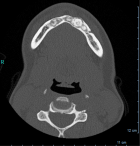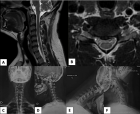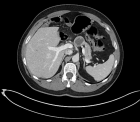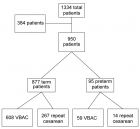Abstract
Case Presentation
Renal denervation for resistant hypertension and heart failure with a reduced ejection fraction
Carles Cañameras Fugasot, Oriol Rodríguez-Leor, Josep Riera Sadurní, Edgar Fadeuilhe, Javier Paul Martínez, Marina Urrutia Jou, Jordi Bover and Maribel Troya-Saborido*
Published: 16 March, 2023 | Volume 7 - Issue 1 | Pages: 001-003
Hypertension is a risk factor for the development of heart failure and has a negative impact on the survival of these patients. Although patients with these two conditions usually take different antihypertensive medications, some patients do not achieve adequate blood pressure control and their hypertension becomes resistant or refractory. In this scenario, percutaneous renal denervation has emerged in recent years as an alternative to achieve blood pressure control goals. We present the case of a 53-year-old woman with a medical history of essential hypertension, hypercholesterolemia, unipolar depression, and diabetes, who was diagnosed with dilated cardiomyopathy with reduced left ventricular ejection fraction (33%). Despite the initiation of multiple antihypertensive medications and placement of a cardiac resynchronization therapy pacemaker, the patient remained hypertensive with a left ventricular ejection fraction of 40%. At that time, percutaneous renal denervation was performed without complications, and one year after the procedure, the patient had improved better blood pressure control and the left ventricular ejection fraction increased to 51%. This case illustrates one of the clinical scenarios in which it has been suggested that renal denervation may be more beneficial, as in the situation of patients with refractory hypertension and heart failure.
Read Full Article HTML DOI: 10.29328/journal.ach.1001033 Cite this Article Read Full Article PDF
References
- Unger T, Borghi C, Charchar F, Khan NA, Poulter NR, Prabhakaran D, Ramirez A, Schlaich M, Stergiou GS, Tomaszewski M, Wainford RD, Williams B, Schutte AE. 2020 International Society of Hypertension Global Hypertension Practice Guidelines. Hypertension. 2020 Jun;75(6):1334-1357. doi: 10.1161/HYPERTENSIONAHA.120.15026. Epub 2020 May 6. PMID: 32370572.
- Kasiakogias A, Rosei EA, Camafort M, Ehret G, Faconti L, Ferreira JP, Brguljan J, Januszewicz A, Kahan T, Manolis A, Tsioufis K, Weber T, von Lueder TG, Smiseth OA, Wachtell K, Kjeldsen SE, Zannad F, Mancia G, Kreutz R. Hypertension and heart failure with preserved ejection fraction: position paper by the European Society of Hypertension. J Hypertens. 2021 Aug 1;39(8):1522-1545. doi: 10.1097/HJH.0000000000002910. PMID: 34102660.
- Beckett N, Peters R, Leonetti G, Duggan J, Fagard R, Thijs L, Narkiewicz K, McCormack T, Banya W, Fletcher A, Bulpitt C; HYVET Study Group. Subgroup and per-protocol analyses from the Hypertension in the Very Elderly Trial. J Hypertens. 2014 Jul;32(7):1478-87; discussion 1487. doi: 10.1097/HJH.0000000000000195. PMID: 24984177.
- Williams B, Mancia G, Spiering W, Agabiti Rosei E, Azizi M, Burnier M, Clement DL, Coca A, de Simone G, Dominiczak A, Kahan T, Mahfoud F, Redon J, Ruilope L, Zanchetti A, Kerins M, Kjeldsen SE, Kreutz R, Laurent S, Lip GYH, McManus R, Narkiewicz K, Ruschitzka F, Schmieder RE, Shlyakhto E, Tsioufis C, Aboyans V, Desormais I; Authors/Task Force Members:. 2018 ESC/ESH Guidelines for the management of arterial hypertension: The Task Force for the management of arterial hypertension of the European Society of Cardiology and the European Society of Hypertension: The Task Force for the management of arterial hypertension of the European Society of Cardiology and the European Society of Hypertension. J Hypertens. 2018 Oct;36(10):1953-2041. doi: 10.1097/HJH.0000000000001940. Erratum in: J Hypertens. 2019 Jan;37(1):226. PMID: 30234752.
- Rodríguez-Leor O. Renal denervation for the management of hypertension. Joint position statement from the SHE-LELHA and the ACI-SEC. REC Interv Cardiol. 2022; 4:39-46.
- Schlaich MP, Schmieder RE, Bakris G, Blankestijn PJ, Böhm M, Campese VM, Francis DP, Grassi G, Hering D, Katholi R, Kjeldsen S, Krum H, Mahfoud F, Mancia G, Messerli FH, Narkiewicz K, Parati G, Rocha-Singh KJ, Ruilope LM, Rump LC, Sica DA, Sobotka PA, Tsioufis C, Vonend O, Weber MA, Williams B, Zeller T, Esler MD. International expert consensus statement: Percutaneous transluminal renal denervation for the treatment of resistant hypertension. J Am Coll Cardiol. 2013 Dec 3;62(22):2031-45. doi: 10.1016/j.jacc.2013.08.1616. Epub 2013 Sep 18. PMID: 24021387.
- Symplicity HTN-2 Investigators; Esler MD, Krum H, Sobotka PA, Schlaich MP, Schmieder RE, Böhm M. Renal sympathetic denervation in patients with treatment-resistant hypertension (The Symplicity HTN-2 Trial): a randomised controlled trial. Lancet. 2010 Dec 4;376(9756):1903-9. doi: 10.1016/S0140-6736(10)62039-9. Epub 2010 Nov 17. PMID: 21093036.
- Barbato E, Azizi M, Schmieder RE, Lauder L, Böhm M, Brouwers S, Bruno RM, Dudek D, Kahan T, Kandzari DE, Lüscher TF, Parati G, Pathak A, Ribichini FL, Schlaich MP, Sharp ASP, Sudano I, Volpe M, Tsioufis C, Wijns W, Mahfoud F. Renal denervation in the management of hypertension in adults. A clinical consensus statement of the ESC Council on Hypertension and the European Association of Percutaneous Cardiovascular Interventions (EAPCI). Eur Heart J. 2023 Feb 15:ehad054. doi: 10.1093/eurheartj/ehad054. Epub ahead of print. PMID: 36790101.
Figures:
Similar Articles
-
Sex Differences in Hypertension: A Question worth Asking?Massimo Leggio*,Mario Lombardi,Paolo Severi,Andrea Mazza,Elisa Caldarone,Massimo Armeni,Stefania D’Emidio,Maria Grazia Bendini. Sex Differences in Hypertension: A Question worth Asking? . . 2017 doi: 10.29328/journal.ach.1001001; 1: 001-005
-
Insights for Antihypertensive pharmacotherapy from the “Calcium Paradox” due to Ca2+/camp InteractionLeandro Bueno Bergantin*,Afonso Caricati-Neto. Insights for Antihypertensive pharmacotherapy from the “Calcium Paradox” due to Ca2+/camp Interaction. . 2017 doi: 10.29328/journal.ach.1001002; 1: 006-009
-
The lifestyle modification effectiveness in reducing Hypertension in a Brazilian Community: From the epigenetic basis of Ancestral Survival to the Contemporary Lifestyle and Public Health InitiativesRoberto Carlos Burini*,Hugo Tadashi Kano,Mariana Santoro Nakagaki,Caroline das Neves Mendes Nunes,Franz Homero Paganini Burini. The lifestyle modification effectiveness in reducing Hypertension in a Brazilian Community: From the epigenetic basis of Ancestral Survival to the Contemporary Lifestyle and Public Health Initiatives. . 2017 doi: 10.29328/journal.ach.1001003; 1: 010-031
-
Systolic Blood Pressure DeterminantsRabindra Nath Das*. Systolic Blood Pressure Determinants. . 2017 doi: 10.29328/journal.ach.1001004; 1: 032-038
-
Does serum uric acid play a protective role against tissue damage in cardiovascular and metabolic diseases?Alexander E Berezin*. Does serum uric acid play a protective role against tissue damage in cardiovascular and metabolic diseases?. . 2017 doi: 10.29328/journal.ach.1001005; 1: 039-041
-
Treating Blood Hypertension in a Brazilian Community: Moving from Reactive Homeostatic Model to Proactive Allostatic HealthcareRoberto Carlos Burini*,Mariana Santoro Nakagaki,Edilaine Michelin,Franz Homero Paganini Burini. Treating Blood Hypertension in a Brazilian Community: Moving from Reactive Homeostatic Model to Proactive Allostatic Healthcare. . 2018 doi: 10.29328/journal.ach.1001006; 2: 001-016
-
Role of Home Blood Pressure Monitoring in Overcoming Therapeutic Inertia and Improving Hypertension Control in MexicoMartin Rosas Peralta*,Hector Galvan Oseguera,Jose Manuel Enciso Muñoz,ANCAM group for HBPM. Role of Home Blood Pressure Monitoring in Overcoming Therapeutic Inertia and Improving Hypertension Control in Mexico. . 2018 doi: 10.29328/journal.ach.1001007; 2: 017-023
-
What is new in Hypertension of Mexico 2018? -Impact of the new classification of high blood pressure in adults from American College of Cardiology/American Heart Association (ACC/AHA)Gabriela Borrayo-Sánchez*,Martin Rosas-Peralta,Janaí Santiago-López,Erick Ramirez Árias,Rosalba García Méndez,Victor Hugo Borja-Aburto,Ana Carolina Sepúlveda-Vildósola,José de Jesús Arriaga-Dávila. What is new in Hypertension of Mexico 2018? -Impact of the new classification of high blood pressure in adults from American College of Cardiology/American Heart Association (ACC/AHA) . . 2018 doi: 10.29328/journal.ach.1001008; 2: 024-030
-
Guidelines that are just for guidanceSwethika Sundaravel*,Jonathan Nieves,Seth Baum. Guidelines that are just for guidance . . 2018 doi: 10.29328/journal.ach.1001009; 2: 031-037
-
Cardiovascular risk reduction: Past, present and future in MexicoGabriela Borrayo-Sánchez*,Martin Rosas-Peralta,Erick Ramírez-Arias,Gladys M Jiménez-Genchi,Martha Alicia Hernández-Gonzále,Rafael Barraza-Félix,Lidia Evangelina Betacourt-Hernández,ocio Camacho-Casillas,Rodolfo Parra-Michel,Héctor David Martínez Chapa,José de Jesús Arriaga-Dávila. Cardiovascular risk reduction: Past, present and future in Mexico. . 2018 doi: 10.29328/journal.ach.1001010; 2: 038-047
Recently Viewed
-
Sinonasal Myxoma Extending into the Orbit in a 4-Year Old: A Case PresentationJulian A Purrinos*, Ramzi Younis. Sinonasal Myxoma Extending into the Orbit in a 4-Year Old: A Case Presentation. Arch Case Rep. 2024: doi: 10.29328/journal.acr.1001099; 8: 075-077
-
Sex after Neurosurgery–Limitations, Recommendations, and the Impact on Patient’s Well-beingMor Levi Rivka*, Csaba L Dégi. Sex after Neurosurgery–Limitations, Recommendations, and the Impact on Patient’s Well-being. J Neurosci Neurol Disord. 2024: doi: 10.29328/journal.jnnd.1001099; 8: 064-068
-
The effect of NLP-based approach to teaching surgical procedures to senior OBGYN residentsMitra Ahmad Soltani,Jamileh Jahanbakhsh*,Zahra Takhty,Azarmindokht Shojai,Hengameh Sheikh. The effect of NLP-based approach to teaching surgical procedures to senior OBGYN residents. Clin J Obstet Gynecol. 2021: doi: 10.29328/journal.cjog.1001075; 4: 001-002
-
Unilateral pleural effusion as the sole presentation of ovarian hyperstimulation syndrome (OHSS)Tarique Salman*,Suruchi Mohan,Yasmin Sana. Unilateral pleural effusion as the sole presentation of ovarian hyperstimulation syndrome (OHSS). Clin J Obstet Gynecol. 2020: doi: 10.29328/journal.cjog.1001074; 3: 182-184
-
Chronic endometritis in in vitro fertilization failure patientsAfaf T Elnashar*,Mohamed Sabry. Chronic endometritis in in vitro fertilization failure patients. Clin J Obstet Gynecol. 2020: doi: 10.29328/journal.cjog.1001073; 3: 175-181
Most Viewed
-
Evaluation of Biostimulants Based on Recovered Protein Hydrolysates from Animal By-products as Plant Growth EnhancersH Pérez-Aguilar*, M Lacruz-Asaro, F Arán-Ais. Evaluation of Biostimulants Based on Recovered Protein Hydrolysates from Animal By-products as Plant Growth Enhancers. J Plant Sci Phytopathol. 2023 doi: 10.29328/journal.jpsp.1001104; 7: 042-047
-
Sinonasal Myxoma Extending into the Orbit in a 4-Year Old: A Case PresentationJulian A Purrinos*, Ramzi Younis. Sinonasal Myxoma Extending into the Orbit in a 4-Year Old: A Case Presentation. Arch Case Rep. 2024 doi: 10.29328/journal.acr.1001099; 8: 075-077
-
Feasibility study of magnetic sensing for detecting single-neuron action potentialsDenis Tonini,Kai Wu,Renata Saha,Jian-Ping Wang*. Feasibility study of magnetic sensing for detecting single-neuron action potentials. Ann Biomed Sci Eng. 2022 doi: 10.29328/journal.abse.1001018; 6: 019-029
-
Pediatric Dysgerminoma: Unveiling a Rare Ovarian TumorFaten Limaiem*, Khalil Saffar, Ahmed Halouani. Pediatric Dysgerminoma: Unveiling a Rare Ovarian Tumor. Arch Case Rep. 2024 doi: 10.29328/journal.acr.1001087; 8: 010-013
-
Physical activity can change the physiological and psychological circumstances during COVID-19 pandemic: A narrative reviewKhashayar Maroufi*. Physical activity can change the physiological and psychological circumstances during COVID-19 pandemic: A narrative review. J Sports Med Ther. 2021 doi: 10.29328/journal.jsmt.1001051; 6: 001-007

HSPI: We're glad you're here. Please click "create a new Query" if you are a new visitor to our website and need further information from us.
If you are already a member of our network and need to keep track of any developments regarding a question you have already submitted, click "take me to my Query."



















































































































































